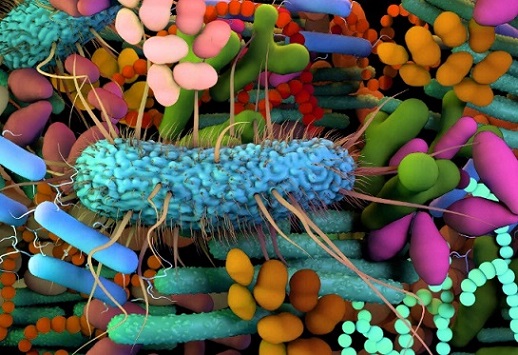Nikhil Prasad Fact checked by:Thailand Medical News Team May 02, 2025 9 months, 1 week, 4 days, 23 hours, 17 minutes ago
Medical News: A Silent Revolution in Health and Environment
In a powerful new review, a team of scientists from top Canadian institutions is calling for a paradigm shift—one that embraces the life-sustaining power of beneficial microbes not just for people, but for animals, agriculture, and the entire environment. The team, comprising researchers from Lawson Health Research Institute and Western University, University of Guelph, University of Waterloo, Inland Norway University of Applied Sciences, King Abdullah University of Science and Technology, and others, argues that microbes are not just germs—they are the unsung heroes of the biosphere.
 Canada Calls for National Microbial Program to Save Health and Planet
Canada Calls for National Microbial Program to Save Health and Planet
They propose launching a national microbial initiative in Canada that would fund research, establish industry partnerships, and develop policy for a new generation of science-driven, microbe-powered health solutions. This
Medical News report reveals that such an initiative could drastically improve everything from mental health and infectious disease outcomes in humans, to pollinator survival, livestock sustainability, and environmental resilience.
The Forgotten Allies in Our Fight for Survival
Microbes play essential roles in every aspect of life—from digesting food to cycling nutrients in the soil and supporting the immune systems of all living creatures. Yet for over a century, governments and regulators have treated all microbes as threats. Only now are scientists beginning to correct this narrative.
The study details the explosion of discoveries following the Human Microbiome Project, which uncovered how deeply interwoven microbes are with human health. But despite the groundbreaking science, Canada has lagged behind in funding and policy support, while other nations like those in the EU and East Asia race ahead with novel microbial therapies, functional foods, and ecosystem-based approaches.
The researchers argue that beneficial microbes could help combat antibiotic resistance, reduce hospital-acquired infections like Clostridioides difficile, and even aid in treating depression and anxiety through targeted strains known as psychobiotics. Specific strains like Bifidobacterium breve and Lactobacillus plantarum have already shown promising results in reducing stress, boosting cognitive function, and enhancing SSRI treatment outcomes.
Microbial Applications Across Ecosystems
The report outlines practical microbial applications in agriculture, animal health, and environmental conservation. Examples include:
-Probiotic use in livestock to replace antibiotics
-Fungal and bacterial biocontrol agents for crop protection
-Fermented foods for metabolic and digestive health
-Microbial treatments to enhance honeybee survival
-Fecal microbiota transplants (FMT) for stubborn gut infections
Yet regulatory
gaps persist. Many Canadians, including healthcare professionals, misunderstand the meaning of probiotics, often confusing them with fermented foods or generalized gut bacteria. The authors emphasize that a true probiotic must contain well-defined strains with clinically proven benefits—most products on shelves today do not meet that standard.
The Call for a National Microbiome Strategy
To counter these issues, the researchers propose ten core recommendations:
-Establish a national program focused solely on beneficial microbes.
-Reform regulatory definitions and product labeling.
-Integrate microbiome education into school and university curricula.
-Promote microbial science across health, agriculture, and environmental sectors.
-Increase funding for clinical trials of microbial therapies.
-Create better consumer guidance and professional training tools.
-Support innovation in fermented food development.
-Streamline health product approvals while maintaining safety.
-Develop clear public communication strategies.
-Promote Canada's leadership on the global stage in microbial health.
If adopted, this program could turn Canada into a world leader in microbial innovation—improving public health outcomes, reducing healthcare costs, and enhancing ecological stability.
Conclusions
The findings show that microbes are not merely invisible passengers in our bodies and ecosystems—they are vital architects of life itself. As the climate crisis deepens, biodiversity erodes, and public health systems strain under rising chronic diseases, Canada must shift from a war-on-microbes model to one of intelligent collaboration. Ignoring these microscopic allies means missing a rare and powerful opportunity to build a healthier, more sustainable future. A national microbial initiative would not only address longstanding gaps in research and regulation but also unify fragmented sectors under a common goal: using nature’s smallest lifeforms to safeguard life on Earth.
The study findings were published in the peer reviewed journal: FACETS.
https://www.facetsjournal.com/doi/10.1139/facets-2024-0182
For the latest on Beneficial Microbes and Microbiome, keep on logging to Thailand
Medical News.
Read Also:
https://www.thailandmedical.news/news/norwegian-scientists-discover-that-metabolite-from-gut-microbiota-found-to-worsen-heart-damage-in-covid-19-patients
https://www.thailandmedical.news/news/gut-microbiome-imbalance-drives-covid-19-severity-and-complicates-recovery
https://www.thailandmedical.news/news/norwegian-scientists-discover-that-metabolite-from-gut-microbiota-found-to-worsen-heart-damage-in-covid-19-patients
https://www.thailandmedical.news/pages/thailand_doctors_listings
https://www.thailandmedical.news/articles/hospital-news
